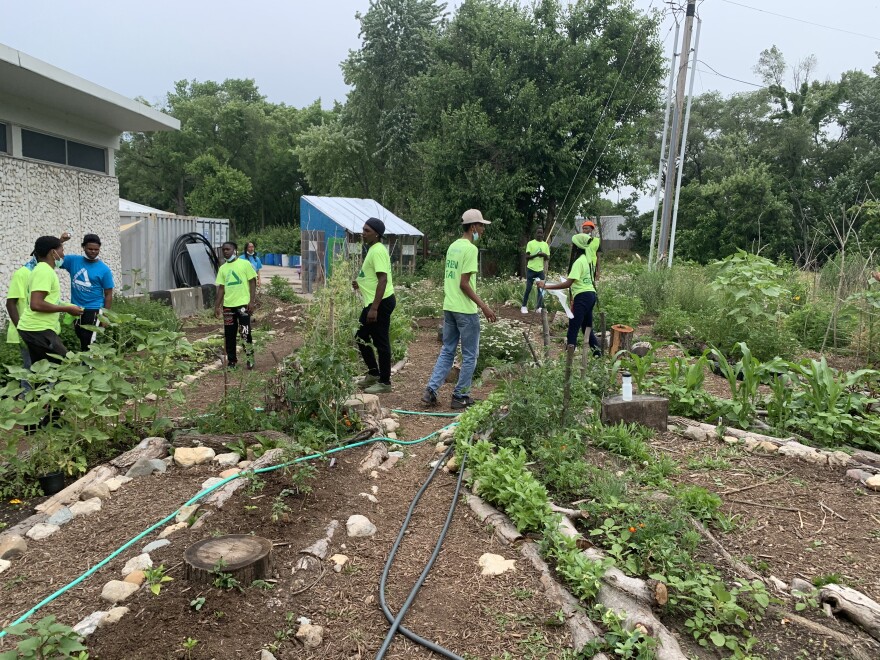On summer mornings, high schoolers in bright green T-shirts gather on the side of Burdsal Parkway north of downtown Indianapolis. As traffic speeds past, they work on designing and growing a quarter-acre vegetable garden.
There’s okra, corn, beans, tomatoes, dill and mint among other vegetables and herbs. In the middle is a small chicken coop.
While the project will yield fresh food for neighborhood pantries and increase the biodiversity of the soil, it is also a much-needed social outlet for many of the youth.
Kenyatta Reed, a 17-year-old with long braided hair and a beaming smile, feels attached to the garden for many reasons.

“It's really for me ... the people ... you feel like you are still at home.
“It's not really just about work. Like it's fun to be here. And you get paid to be here. So it’s just double fun for me.”
The project is part of a youth development program organized by Groundwork Indy, a nonprofit focused on environmental projects. The program has run every summer since 2016, and this year a group of students called the Green Team is focused on the garden.
Youth like Reed get paid as much as $10 an hour. She uses that money to help with family bills and to do some shopping for her herself.
As the youth chop wood, landscape, compost and delicately take care of baby plants, they’re guided by Phyllis Boyd, Groundwork Indy’s executive director. Her soil-smudged T-shirt shows that she also works with her hands as she explains the basics of gardening and taking care of the environment.
The garden’s layout is unconventional. Snake-like paths outlined by logs guide visitors and gardeners so they don’t trample the baby plants. There is science behind this set up, Boyd explained, as she pointed to a tomato plant that grows next to some basil.
“So here actually, the marigolds and the basil are protecting the tomatoes from nematodes in the soil,” she said. “They are like little worm arthropods that eat at the roots [of tomato plants].”

Overcoming Environmental And Social Injustice
Boyd draws from history and her expertise as a biologist and landscape architect to teach the high schoolers. Her lessons aren’t just on how to garden — but on how youth can affect real, tangible change.
“And that's one of things we like to do, is not just have them involved in the hands on work that's dirty and heavy,” she said. “But actually have them engaged in the process of how you think and dream about spaces and how you can change them ... so they get to see the whole arc of how you as a person can do stuff in the world.”
For example, Boyd and the youth had to test the soil for lead contamination when they chose the spot for the garden. Lead is a toxin used in some industries and can be found in soil, old house paint and water. It is especially harmful to young kids.
This neighborhood is a hotspot for lead poisoning in children and elevated lead levels. And the garden soil was no exception — but the Green Team had an efficient solution.
“You bring lead free soil in and you garden with that soil. And that's what you're in contact with, not the soil that's underneath,” Boyd said.
This area also lacks grocery stores, which may be one reason it has one of the lowest life expectancies in the city. In fact, less than eight miles away, life expectancy increases more than 11 years in a predominantly white, affluent neighborhood that has an abundance of grocery stores and fresh markets.
Boyd said the garden will provide some of its produce to local pantries, neighbors and potentially sell it at the local Riverside Farmers’ Market.
But she is not counting on this garden's produce to make a dent in food access problems. It's the youth learning how to grow their own food and being exposed to different kinds of vegetables that could make a difference.

An Outlet From 'Rigid System'
Katy Hawthorne, a 22-year-old program supervisor, said the youth aren't always allowed a space to try out new things and think of creative solutions the way they are encouraged to do at the garden.
“You know, a lot of them are going to my high school, and I know how I struggled while I was there,” Hawthorne said.
Hawthorne, who came to the program during a college internship, has a degree in public health and anthropology from Purdue University. Like many of the youth here, she struggled to find nurturing, safe spaces. In college, she noticed “a night and day difference” compared to the amount of freedom she had as a high schooler in the neighborhood.
“Just people not letting kids be kids. When they say that inner city schools are run like prisons, I think that's a very serious statement,” Hawthorne said. “The presence of police and them not being able to handle typical kid activity ... it's just a very rigid system that doesn't allow for creativity, doesn't allow for them to make mistakes and learn from them in a valuable way.”
She said this garden is a place the Green Team feels appreciated and free to make mistakes and learn from them. It’s hope and a respite from a harsh reality they live day in and day out.
Families interested in enrolling their youth in one of Groundwork Indy's youth development programs can go to the organization's website and fill out the form. They can also email darren@groundworkindy.org for any questions.
This story was reported as part of a partnership between WFYI's Side Effects Public Media and The Indianapolis Recorder.







